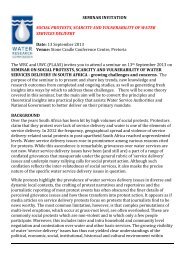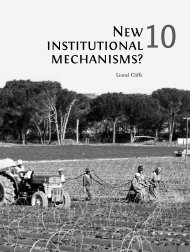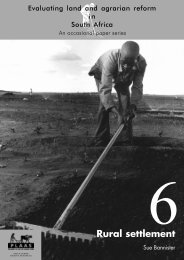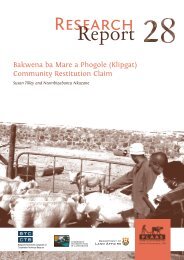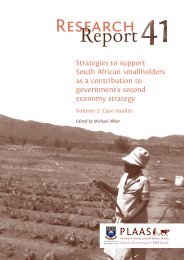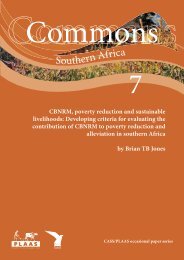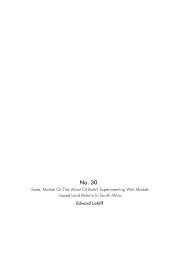A critical appraisal of South Africa's market-based land reform policy
A critical appraisal of South Africa's market-based land reform policy
A critical appraisal of South Africa's market-based land reform policy
You also want an ePaper? Increase the reach of your titles
YUMPU automatically turns print PDFs into web optimized ePapers that Google loves.
Chapter 2: International <strong>land</strong> <strong>reform</strong> debates<br />
ding rural <strong>South</strong> Africa, raises further<br />
questions about the availability <strong>of</strong> labour.<br />
Studies are increasingly showing a negative<br />
impact on productivity in agriculture<br />
due to HIV/Aids. A study in Kenya found<br />
that the labour-intensive agricultural sector<br />
suffered most from the impact <strong>of</strong> HIV/<br />
Aids, compared to other sectors (Topouzis<br />
2000:24). A study in Tanzania found that<br />
women spend 45% less time in agriculture<br />
if their husbands are sick (Guinness &<br />
Alban 2000:5). Agricultural outputs have<br />
dropped dramatically in Aids-affected<br />
households in Zimbabwe, with a 61% fall<br />
in maize production (Guinness & Alban<br />
2000:8). The effects <strong>of</strong> HIV/Aids may well<br />
neutralise the prospects for growth in<br />
agriculture and wipe out the benefits,<br />
perhaps even the viability, <strong>of</strong> the smallscale<br />
owner-operated farm model.<br />
Land <strong>reform</strong> in <strong>South</strong> Africa<br />
As negotiations to end apartheid proceeded<br />
in earnest in the early 1990s, those<br />
aspiring to lead the country after liberation<br />
faced a crisis <strong>of</strong> slow economic growth,<br />
high inflation, mounting government<br />
debts, growing poverty and massive<br />
inequalities in wealth (Thompson 1995:<br />
261). In this context it would be necessary<br />
to meet the redistributive demands <strong>of</strong> those<br />
in the liberation struggle and the poor in<br />
general, while not provoking a right wing<br />
back lash, and avoiding the flight <strong>of</strong><br />
capital and skills from the country.<br />
The World Bank, along with allied<br />
academics, had started to engage in <strong>policy</strong><br />
debates in <strong>South</strong> Africa from 1990, and<br />
they appear to have had a strong influence<br />
on <strong>policy</strong> development with their<br />
proposals for a <strong>market</strong>-<strong>based</strong> <strong>land</strong> <strong>reform</strong><br />
model (Williams 1996). These proposals<br />
were well captured in the book Agricultural<br />
<strong>land</strong> <strong>reform</strong> in <strong>South</strong> Africa edited by<br />
academics from the University <strong>of</strong> Pretoria<br />
and the World Bank. The influence <strong>of</strong><br />
some <strong>of</strong> these academics has continued<br />
with their involvement in the drafting <strong>of</strong><br />
the Land Redistribution for Agricultural<br />
Development <strong>policy</strong> document released in<br />
2001 and the Strategic Plan for <strong>South</strong><br />
African Agriculture released in 2002. 5<br />
Other inputs to the <strong>policy</strong> discussions<br />
came from local academics and <strong>land</strong> activists<br />
through local research and community<br />
consultation processes (Williams 1996). A<br />
national research project co-ordinated by<br />
the Land and Agriculture Policy Centre<br />
(LAPC) 6 included community-level<br />
research and consultation and attempted<br />
to find ways <strong>of</strong> delivering <strong>land</strong> that<br />
responded to a demand for <strong>land</strong> that was<br />
informed by social needs, not just <strong>market</strong><br />
forces (Marcus et al. 1996:1). The assumption<br />
at the time was that government was<br />
committed to a <strong>land</strong> <strong>reform</strong> that would<br />
target the ‘poorest <strong>of</strong> the poor’ (Marcus et<br />
al. 1996:13).<br />
The <strong>land</strong> <strong>reform</strong> policies <strong>of</strong> <strong>South</strong><br />
Africa’s first non-racial democratic<br />
government begin with the Constitution<br />
and the Reconstruction and Development<br />
Programme. The RDP document, which<br />
became the election manifesto <strong>of</strong> the ANC<br />
in its 1994 election campaign, was drawn<br />
up by activists from the liberation movement,<br />
but clearly showed some <strong>of</strong> the<br />
influence <strong>of</strong> the World Bank and other<br />
advisors. It was also heavily influenced by<br />
the compromises that were being negotiated<br />
in order to facilitate the relatively<br />
peaceful change <strong>of</strong> regime in <strong>South</strong> Africa.<br />
Demands that had been part <strong>of</strong> the politics<br />
<strong>of</strong> liberation movements, such as the call<br />
<strong>of</strong> the 1955 Freedom Charter that the <strong>land</strong><br />
should belong to those who work it, were<br />
not given expression in the RDP.<br />
Section 25 <strong>of</strong> the Constitution deals<br />
with property and <strong>land</strong> rights. Existing<br />
property rights are protected under Section<br />
25(1) while Section 25(2) allows for expropriation<br />
only in terms <strong>of</strong> a law <strong>of</strong><br />
general application ‘for a public purpose<br />
or in the public interest’ with ‘just and<br />
equitable’ compensation (Section 25(3)). 7<br />
However, Section 25(4) goes on to say ‘the<br />
public interest includes the nation’s<br />
commitment to <strong>land</strong> <strong>reform</strong>’. Sub-sections<br />
25(5), (6) and (7) require the state to take<br />
legislative and other measures to ensure<br />
<strong>land</strong> <strong>reform</strong>s. Thus the Constitution, while<br />
9




